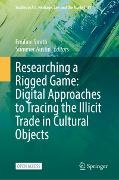Read more
This open access book on open-source data and the trade in cultural heritage is foundational for object biography, provenance research studies, and social science methodological education.
Interest in studying the (illicit) trade in cultural objects, as well questions around ownership, access and protection, have grown in recent years. However, this interdisciplinary field requires a range of methodological skills in order to trace an object's ownership history and the social network underpinning its trade. Drawing from a diverse group of researchers and practitioners, this edited volume brings together methodological, ethical and disciplinary considerations in the use of open source data to research the trade and transfer of cultural objects. As such, it will serve as the paramount guide to anyone who is interested in doing research on this topic.
List of contents
Introduction.- Open-Source Intelligence (OSINT) for Researchers and Practitioners.- The Power of Quantifying Open Sources to Create Robust and Reliable Cultural Heritage Data.- From Open-access Spatial Data to Building a Typology of Looting Pits and Trends in Arid and Semi-arid Landscapes.- RITHMS Digital Platform: Social Network Analysis for Intelligence-Led Policing of Cultural Heritage Crime.- Detecting Deception in the Art Trade: A Computational Approach to Uncertainty, Unreliability, Anonymity and Red Flag Names.- Looking across collections: ethical challenges and considerations of using museum collection data to conduct provenance research at scale.- Cataloguing Authenticity: Exploring Collection Engagement with Forged Papyri through Online Catalogues.- Filling in the Blanks: The Use of Digitised Historical Newspapers to Contextualise Auction Data.- A Discipline That Sat On Its Treasures, But Didn’t See Them: Leveraging Online Auction Data for Design Historical Research.- Beyond the Streetlight: What the Reporting of the British Museum Thefts Reveals About the Antiquities trade – and What It Doesn’t.- From Policy to Practice: Analyzing the Impact of Cultural Property Policies in Combating Antiquities Trafficking in the United States.
About the author
Dr Emiline Smith is a Lecturer in Criminology at the School of Social and Political Sciences of the University of Glasgow. She is a Fellow at the Centre for Criminology at the University of Hong Kong, and a member of the Scottish Centre for Crime and Justice Research, the Trafficking Culture Research Consortium, and the Global Initiative Against Transnational Organized Crime.
Summer Austin is based at University College London's Institute of Archaeology. She works as an archaeologist focused on cultural heritage crimes, the (il)licit antiquities trade, transnational crime and the art and antiquities market.
Summary
This open access book on open-source data and the trade in cultural heritage is foundational for object biography, provenance research studies, and social science methodological education.
Interest in studying the (illicit) trade in cultural objects, as well questions around ownership, access and protection, have grown in recent years. However, this interdisciplinary field requires a range of methodological skills in order to trace an object's ownership history and the social network underpinning its trade. Drawing from a diverse group of researchers and practitioners, this edited volume brings together methodological, ethical and disciplinary considerations in the use of open source data to research the trade and transfer of cultural objects. As such, it will serve as the paramount guide to anyone who is interested in doing research on this topic.

